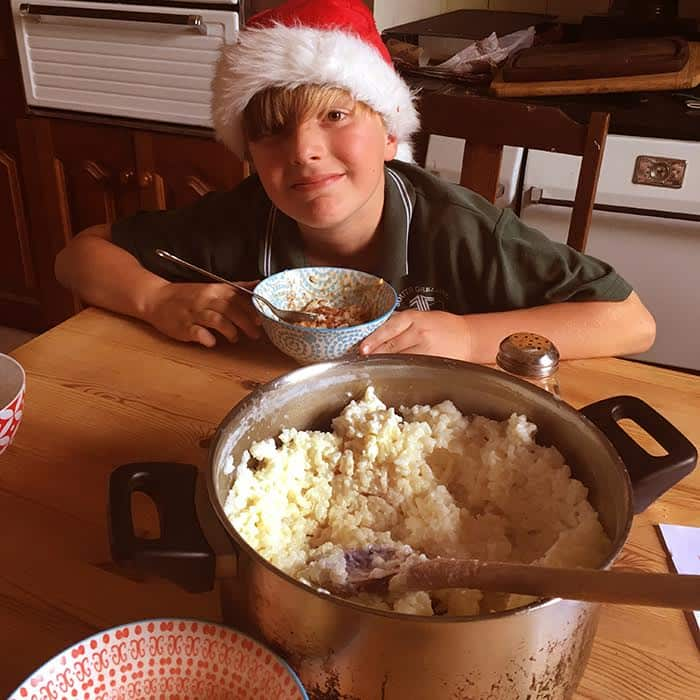Modern Australian society is culturally and ethnically diverse with almost half of the population, 49 per cent, born overseas or having at least one parent who was born overseas.
Our work environment at SBS reflects this multiculturalism too, with people who work here coming from all corners of the world - particularly at SBS Radio, which is home to 68 different language programs.
This year we asked a range of our broadcasters, whose homelands celebrate Christmas, to name one Christmas dish served in those countries - to help you bring the multicultural spirit of Australia to your Christmas table.
Christmas specialties from 10 different countries
Here in Australia we are catching up with many countries in their Christmas celebrations as many of them actually start on Christmas Eve - making the 24th of December the key day instead of the 25th. Australians usually have to wait an extra day to unwrap the gifts and start the BBQ.
Bulgarians definitely take pride and a lot of creativity in their preparations for Christmas Eve dinner, where they serve 13 different vegetarian dishes.
Following the Catholic procedures of the fast, no meat is allowed on table.
"The most popular dish is Sarmi – sour cabbage leaves stuffed with rice, onion and parsley," he says. "You can also stuff grape leaves but remember to avoid any type of mince."
Danish
Seems like in Denmark they have been pursuing recycling since the time baby Jesus was born because, as our colleague from Denmark Mik Aidt said, while celebrating Christmas they don’t waste food.
The Danes start the festive season before the rest of the world, on the 23rd, serving a rice porridge called Risengrød.
However, when they serve it the next day, it’s called Risalamande, a revamped version with added cream and almonds. Here is how you make Risengrød.
Here is how you make Risengrød.

Source: Submitted by Mik Aidt
The Baltic country Estonia embraces its negative temperatures outdoors when celebrating Christmas.
Estonians need heavy food and Verivorst (don't be tricked by the name), the blood sausage stuffed with barley and accompanied with the stewed sauerkraut, or jellied meat - Sült, are just the right fit.
The Süllt is made of a variety of meat including hocks, oxtails and head parts and this is the speciality of the Estonian jellied meat.
It's a true food experiment for the first-time jellied meat tasters, since the concept of this dish has not made its way much outside Nordic countries.
Traditional English Plum pudding this year can be served under its French equivalent name – A Bûche de Noël or yule log.
Sharing his childhood memories, Executive Producer of the SBS French program Christophe Mallet suggests preparing enough decorative figurines that go on top of the log since every child in the family insists on having one.
"If you are not a big fan of white chocolate," he says, "simply make it dark."
It was not easy for our Italian friends to choose just one dish. The culinary and culture of the country is so diverse to the point that some parts have their main celebrations on the 24th and others on the 25th.
Uova Ripiene, which is a great antipasti dish, was the one the Executive producer of SBS Italian, Magica Fossati was able to adapt to Aussie taste buds and carry on cooking every year for Australian Christmas.
In Poland they stick to the Catholic laws of abstaining from meat and keep their dishes fish-based.
Although carp is not considered of great value in Australia, in Eastern Europe where they have plenty of it, carp is often the basis for many fish meals.
SBS Polish producer Dariusz Buchowiecki says that on Christmas Eve they make sauerkraut and mushrooms as a side dish.
The Slovaks warm up on Christmas Eve with a good bowl of cabbage soup called Kapustnica.
"In Slovakia they stretch the celebrations for three days starting on the 24th and some of the leftovers are remade for the next day," explains the Executive Producer of the SBS Slovak program, Andrej Bucko. "The festive season days conclude on the 26th after the visit of the church."
In Latin America the big celebrations fall onto 24th as well, as producers of SBS Spanish Marcia De Los Santos and Carmenza Jimenez explain.
There is no feast without Asado meat in Argentina, the BBQ ribs traditionally made on hot coals on your backyard. Nowadays, respecting the tradition but preferring more convenient ways, people switched to Weber.
On the other side of Latin America, in Colombia, no single family would have Christmas dinner without Natilla. It’s a sweet custard based dessert with family recipes carefully kept by grandmothers.
Rwandan
He explains that Christmas in his country is shaped differently to the Western world, as the country is very religious and not economically advanced.
For example, "gift giving doesn’t exist there," says Bertrand.
"While people still get together, the place for public gathering is the church which on Christmas Eve can’t even fit everyone."
So what about the feast? Bertrand explains, "Rwandans don’t have a special dish but they do have a special home brewed drink – Urwagwa, a banana beer or wine."
"Since guests come in unannounced, each family cooks a lot to be able to feed anyone.
"The supplies usually come from their own backyard.
"This day anyone is welcomed and joy spills into the streets."
These multicultural feast ideas have been brought to you by SBS Russian who wish you a happy and tasty holiday season!
